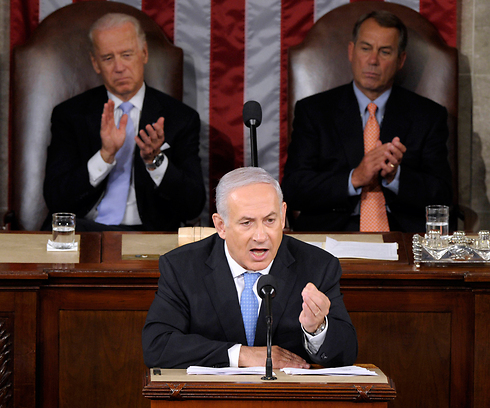
Netanyahu's Congress speech will have to bring something new to the table
Op-ed: If the prime minister's speech does indeed spur broad Congressional opposition to the P5+1 deal with Iran, Obama has a series of options still available to him.
If nothing unexpected happens, Prime Minister Benjamin Netanyahu will deliver his speech in the United States Congress on Tuesday evening, Israel time. His speech will focus on the proposed agreement between the P5+1 states and Iran regarding Iran's nuclear project.
While most senators and representatives will attend the speech, dozens have boycotted, and in order to justify his decision to speak to the Congress, Netanyahu will have to ensure that his address brings some new information or new arguments as yet unheard in his many reflections on the Iranian issue.
Netanyahu's decision to accept the invitation from Speaker of the House John Boehner is an unprecedented event in the relations between the United States and Israel. His speech will be delivered notwithstanding a strong opposition to the speech by President Obama and other members of his administration.
Throughout the years, since its establishment, Israel has always done all it could to refrain from a direct confrontation with the president of the United States. It is clear that the president is the most symbolic reflection of the American unity. Thus anything that might seem to be harmful to the president's status and prestige by a foreign nation, would be rejected even by those who oppose the president's policies and his intention to conclude a deal with Iran regarding its nuclear project.
From Netanyahu's point of view, the speech before Congress has been imposed upon him due to the seemingly grave erosion in Obama's commitment to preventing Iran from becoming a nuclear power. Netanyahu argues that the intended agreement between P5+1 states and Iran will necessarily include recognition of Iran as a potentially nuclear state. This status will enable Iran to make the necessary moves to become a concrete nuclear power at a time of its choosing.
Netanyahu expresses grave doubts regarding the ability of the inspection teams to become aware in real time of any Iranian decision to become a nuclear state. In any event, he argues, the inspection procedure is undertaken due to the "good will" of Iran. That means that whenever Iran deems it suitable for its national interests, it would be able to stop the functioning of the inspectors.
Even now, when Iran is trying to demonstrate willingness to cooperate with the international community, it refrains from supplying crucial information to the IAEA. This reality, Netanyahu stresses, is creating a concrete threat to the very survival of the State of Israel, and he is determined not to let this happen.
In response to the arguments that he should have tried to negotiate with the White House in order to convince President Obama to strike a better deal for Israel, Netanyahu argues that this is not a realistic arguement. In his view, Obama is determined to reach a deal with Iran, one that would endanger the interests of the State of Israel. The disagreement between Israel and the United States on this issue, he implies, is real and can no longer be hidden under the table by vague statements about the "unbreakable bond" between the two nations.
Even Obama has admitted the existence of a disagreement between the United States and Israel with regard to the Iranian nuclear project. He even urged leaders of the P5+1 nations to make an effort to convince Congress members to support the coming agreement.
Netanyahu further argues that the timing of the speech has been imposed upon him as the P5+1 states have agreed with Iran that the agreement will be signed by March 24, 2015, and its final formulation will be achieved in the months afterward.
The prime minister is certainly well aware that the timing of the speech has raised suspicions that he wishes to use it to enhance his position in the upcoming elections in Israel. Consequently, various circles in Israel have made it known that they oppose the speech, which they consider to be harmful to the cause that the prime minister wishes to advance – namely, preventing Iran from becoming a nuclear state.
The lack of consensus within Israel with regards to the speech and the heated debate as to the best way for it to deal with the Iranian menace has certainly weakened Netanyahu's position vis-à-vis the Obama administration.
The bottom line in Netanyahu's speech will most probably be that the agreement that was proposed to Iran by the P5+1 states would by definition recognize Iran as a potentially nuclear state. At the same time, it would necessarily significantly reduce the sanctions imposed upon Iran.
The system of inspection proposed by the agreement ultimately depends on the good will of the Iranian administration. For now, Iran gives the inspectors relatively wide freedom to maneuver because it suits its interests. Who can guarantee that it will act similarly in the near or more distant future?
Congress, Netanyahu believes, has the power to prevent the affirmation of the agreement proposed by Obama.
If indeed Netanyahu's speech does create a broad consensus of opposition to the agreement within Congress, the Obama administration might undertake one of the courses of action:
1. Engage in intensive and drawn-out confrontation with Congress and the State of Israel, in the hopes that eventually it becomes clear that the executive branch has a dominant role in the formulation of United States foreign relations. Thus, when the White House considers an agreement with Iran as the best way to advance US national interests, Congress cannot interfere.
2. Admit his inability to reach an agreement with Iran that would be formally approved in accordance with the United States constitution. In this case, relations between the United States and Iran would return to the status that existed before the start of dialogue between the P5+1 states and the Islamic Republic.
3. Reaching secret understandings with the Iranian leadership, that would not be included in a formal agreement, in the hopes that after the March 17 elections in Israel , a new prime minister will emerge who is will much more forthcoming towards Obama than Netanyahu.
The history of US relations with Israel shows that a confrontation between the two does not have a long enduring negative effect on the ability of the two states to enhance their strategic ties. Eventually, both leaderships are pragmatic and wish to advance the national interests of their respective countries without giving prior incidents an opportunity to be disruptive.
Prof. Zaki Shalom is a senior research at Ben-Gurion University and the Institute for National Security Studies.











